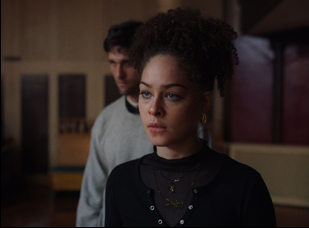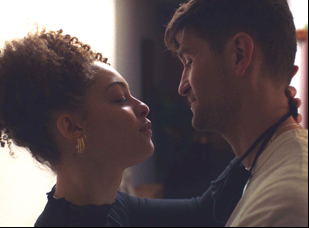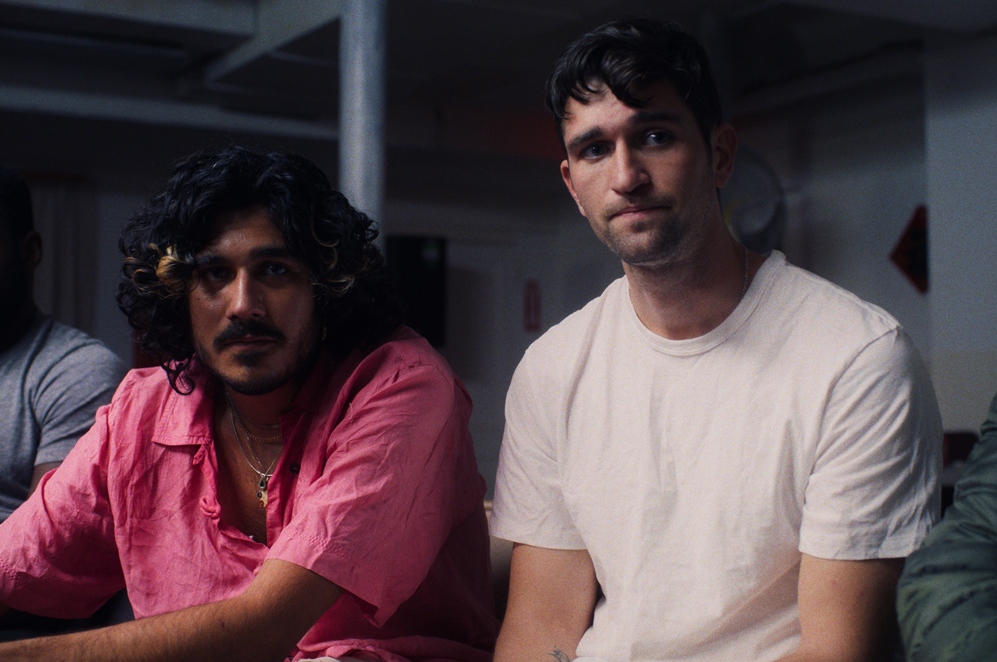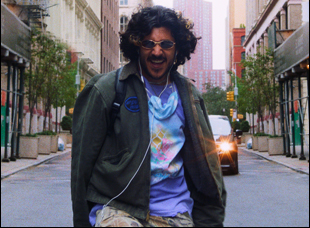Daniel Antebi realized he had been hiding something from himself when put in a crunch to make a movie after the pandemic derailed his plans to make another, with a old idea resurfacing quickly to give birth to a new one in “God’s Time.”
“I had an idea for a short film years ago before I even came up with ‘God’s Time’ of someone in a recovery meeting whose job it was to time the other people [in the group],” says Antebi, who can be seen channeling positive takeaways from his own time in recovery with his debut feature. “Instead, we would continuously cut to a closeup of [this person’s] hand where we would see if he let people have extra time, depending on their share. That image was where [the title] ‘God’s Time’ was born out of, which actually doesn’t even make its way into the movie, but then eventually [the title itself] just found its way into Regina’s monologue because it was just such a killer phrase.”
Antebi could mean this in a variety of ways when Dev (Ben Groh) comes to believe that Regina (Liz Caribel Sierra), a fellow member of his recovery group seemingly no matter where he sits down in New York City, might be finally ready to murder an ex after she omits the critical phrase “in God’s time” during her share after months of preaching patience that his comeuppance is coming for having done her wrong. When it’s what Regina doesn’t say that might hold the truth in the meetings that demand honesty as much for one another as to themselves, “God’s Time” has an extra bit of torque for what already is an adrenaline-pumping caper as Dev and his friend Luca (Dion Costelloe) put aside their plans to potentially further their would-be acting careers at an audition to try to stop Regina from committing a homicide, though the evidence is specious at best that such thoughts are even roiling around in her mind.
Although things go wildly out of control in “God’s Time,” Antebi has them well under his in the exhilarating, madcap race against the clock, underlining the thrill of the chase with how such a single-minded pursuit plays into the worst impulses of the former addicts it follows, all trying to put the past behind them, while revealing how coming clean is a process that is even more difficult than freeing themselves of any chemical dependency, forcing them to be truthful about where they’ve been to get to where they’re going. After premiering at the Tribeca Film Festival last year, the film is racing into theaters now and recently Antebi spoke about how “God’s Time” grew out of meetings he attended in a variety of ways when it’s where he met his two lead actors and co-writers on the film Groh and Costelloe, as well as filming in New York City in the midst of the pandemic and knowing when to let loose.
I had another movie in development for a few years with the Sundance Labs and Killer Films and the Department of Motion Pictures, and [it] was going to go and then COVID happened. I got a phone call saying, “Hey, we can’t make movies right now the way we normally make them, so let’s kick the ball down the road.” I couldn’t really take no for an answer, so I had to jump on this and I basically wrote it with my friends Ben and Dion, who are in recovery just like me. A hundred days or so later, we were on set.
What it was like to bring Ben and Dion into the fold for this?
I met them both in recovery and I thought they both had such peculiar and interesting energies and they were such great contrasts for each other. Dion naturally [was] a bit more of a straight man and Ben [was] a bit more eccentric, so it was obvious that they were going to star in it and we were going to come up with it together. The really fun thing is we would meet up in the mornings on Zoom and do writing exercises [with prompts like] three times we kept a secret from a best friend, three times that we felt like we needed to break into a place that we weren’t allowed to go into, and in sharing stories with each other, we created a tapestry of a collective experience that ended up becoming the movie.
Liz feels like a real discovery. How did she come into the mix?
We had been looking for an A-lister, someone who could carry the movie as a face for quite some time, and we were down to the wire a week before shooting. We had a table read for the studio, and the casting directors sent me a bunch of tapes and Liz was one who could make it for the table read. I watched her tape and called everybody on the team and said, “We found her, we don’t need to look anymore.” The beautiful thing about Liz is that she not only is a stellar actor, but also authentic to the character, so it was just a massive blessing to find her and hopefully becomes a lifelong collaborator.

Oh, totally. Every once in a while after we’ve done a bunch of takes, I say to the actors, “Okay, let’s do a version where you’re not allowed to do any of the lines from the script,” and all of a sudden, they start throwing in flavor and imagery from their own lives. I was surprised every day by the things these three came up with. One of the first things that I tell actors is the scene’s not over until we call cut, and so they gotta just keep going. But the beauty of working with really great actors is that they don’t just do improv for improv’s sake. What they’re doing is they know that they need to hit certain beats and improv within them, so actors that I work with get to know that’s my way of operating. The first thing I learned to do was how to edit in Premiere at like 14, so I can chop everything out, “don’t worry. Like let’s have fun with it.” I have a penchant for sometimes talking to the actors even during the take to adjust them or to feed a line or to ask a question, just to see them think about the answer. Then with the choreography of the camera, I’m very much of the mind of having an extensive plan and then ready to throw it out when you’re on set.
What was it like to just geographically map out a shoot like this across the city?
I actually had the privilege of speaking with Joe Talbot who did “The Last Black Man in San Francisco” a year or two before making “God’s Time” in a Sundance-type lecture setting and Joe was explaining to us that the way they got the locations to feel so authentic in “Last Black Man” was that they wrote the script and then they would location scout and then rewrite the script for the location, so we did a lot of that and that’s how we adjusted. Then it was a lot of trickery in the camera to make the locations seem like something they aren’t [at times], like one location being several different meeting spaces when it was really just one building.
Something that looked like you couldn’t fake was filming Ben on the streets on that bike. What were those scenes like to shoot?
That was all CGI. [laughs] Yeah, that was wild. For a lot of that, we had a cop and then some of that, it was stolen and I was very grateful that Ben can ride for hours and hours and hours and not get tired. But New York was relatively empty then. It was fall of 2020, so we had pretty bare streets, and as Emily [Korteweg], our producer, loves to [say], we had just cops eating donuts, sometimes watching us and we’re wondering why they weren’t calling it in.
You seem to really embrace the pandemic – it says something about the characters when they’ll wear a mask a certain way or what mask they wear. Was that an easy decision not to ignore it?
We weren’t going to act like it wasn’t happening. That would feel inauthentic to what we were all living. But my goal was to make it something that was present, but added to certain characters or it faded into the background. When Ben and Dion are in a scene where they’re incredibly emotionally blocked from each other, they’re wearing the masks and they’re in a hospital and it makes sense for them to not be able to talk easily there. Then there’s the rich lady in the Upper West Side who doesn’t wear anything but the face shield because she thinks that’ll do something, so it felt like just another opportunity to do costume and character design.
When you came into this from an editing background, the graphics and the music both add a lot to the film – was a lot of it in mind from the start or was there leeway to work on it in post?
With the animation, it was 50/50 premeditated and 50% we were on Fiverr paying people like a hundred bucks to like make a pixelated dev fly into the air with angel wings. [laughs] A lot of it was playing around. Then for the score, a lot of [the credit] goes to Brian Reitzell. I knew it was going to start in this like jazzy place and eventually it was gonna go to more Trent Reznor/Atticus Ross [style] and I thought the transition was going be most interesting and Brian was a dream. He would go to the bathroom in the studio and let me play things myself and he’d be like, “Oh, that’s really cool.” And then I’d play something on the drums and then he’d play it much better than I could, so it was very collaborative and it was one of my favorite parts of the whole experience.

There’s a garage sequence in the film that’s like a climactic sequence that we shot for two days and we had an armor there, and it was my first time working with firearms in a film. That was particularly stressful. Then there was one day where we did like 50 or 60 setups in one location and that was wild. But more than anything, I remember on the last day I almost got hit by a car and when we were at the wrap party, I told my producer, “Well, thank God no one got COVID. If I got hit by a car, at least the footage exists.”
It was such an invigorating blast of energy for me. What’s it been like for you getting it out into the world?
It’s such a blessing. I had the terrible curse as a younger filmmaker of being so precious with my short films [where] I would finish them, but I would shelve them. [With “God’s Time”] I didn’t have a choice because this is this is not my own money and it’s been going great. I’m so proud of the film. There’s nothing like meeting a stranger who’s watched my movie and has their own point of view and has certain characters they like and don’t like. It’s probably one of the biggest privileges as a filmmaker is getting to share work.
“God’s Time” opens on February 24th in New York at the IFC Center and in Los Angeles at the Laemmle Glendale.





